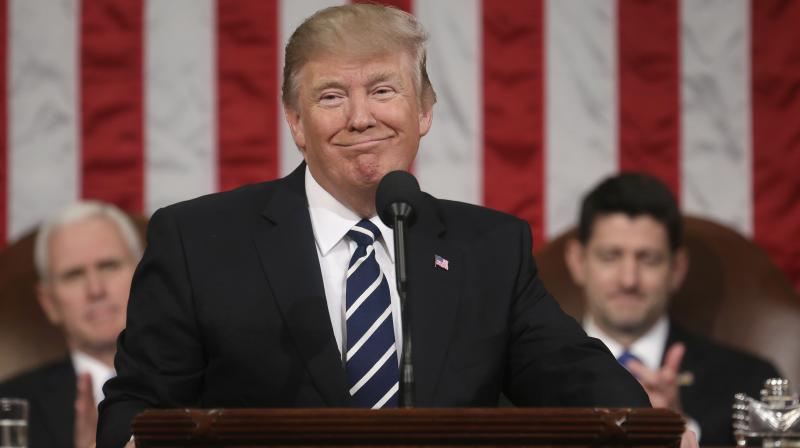Trump admin pledges to act on hate crimes against Hindu, Sikh communities

Washington: The Trump administration on Tuesday pledged to work against recent surge in hate crimes, including those against the Hindu and Sikh communities, and said it has established a task force subcommittee to look into the issue and submit its recommendations.
"The Attorney General (Jeff Sessions) has made fighting violent crime one of his top priorities," Eric Treene, special counsel for religious discrimination civil rights division at the Department of Justice, told the Senate Judiciary Committee during a hearing on increase in religious hate crime.
One category of violent crimes are those based on actual or perceived race, color, national origin, gender identity, religion, sexual orientation, disability, and similar factors,generally known by the shorthand hate crimes, Treene said, adding that addressing hate crimes must be part of our national effort to reduce violent crime.
In February, Sessions established a task force on Crime Reduction and Public Safety. The task force has a Hate Crimes Subcommittee, which will develop a plan to address hate crimes to better protect the rights of all Americans.
On June 29, the Hate Crimes Subcommittee will hold an additional one day summit focusing solely on identifying, prosecuting, and preventing hate crimes.
In his testimony, the Justice Department official referred to the several instances of hate crimes against Indians, Hindu and Sikhs communities.
"An arrest has been made in the Kansas City shooting the President referenced, in which two Indian-American men were shot, one fatally. That investigation is ongoing," he said.
Senator Chuck Grassley, Chairman of the Senate Judiciary Committee, said religious hate crimes are on the rise.
"Crimes against Jews are the most common religious hate crimes and they have increased. Religious hate crimes against Muslims are the fastest growing category. These crimes increased by 67 per cent between 2014 and 2015, the last year for which FBI figures are available," Grassley said.
Asserting that fear for practicing one's religion should never happen in this country, Grassley said that government action to enforce the First Amendment's guarantee of free exercise of religion is necessary if these rights are to be protected against those who commit hate crimes.
Too many people in this country feel unwelcome, unsafe, said Indian-American Vanita Gupta, a former civil rights official at the Justice Department under Obama administration.
"Ultimately eliminating prejudice in the US will require that Americans develop respect for cultural differences and establish dialogue across racial, ethnic, cultural, and religious boundaries," she said, adding education, awareness, and acceptance of group differences are the cornerstones of a solution to prejudice, discrimination, and bigotry in the US.
From the tragic shooting of two Indians in Kansas to mosque arsons and synagogue vandalism to the defacing of a Maryland church, an alarming number of gut-wrenching incidents of hate-motivated violence have shaken the public, Gupta said.
"It is incumbent upon all of us to reduce hate violence and bias-motivated incidents. Hate crimes have been referred to as this country's original form of domestic terrorism," Gupta said in her testimony.
"There is no question that many South Asians, Sikhs, and people of other faiths are targeted because people believe they are Muslim. However, we cannot lose sight of the fact that many people are also targeted because of their actual identity," she said.
Sikhs, for example, may be mistaken as Muslims, but they also have a long history in this country and in others of facing persecution and discrimination, Gupta said.
Dr. Prabhjot Singh, a Sikh American who has experienced hate violence first hand, said while it is clear that Sikh Americans are not alone in experiencing a rise in hate crimes, the experience of the community is important to understand how dangerous this current era of inflammatory rhetoric promises to be if action is not taken.
According to Sikh Coalition surveys published between 2008 and 2010, approximately 10 per cent of Sikh respondents in New York City and the San Francisco Bay Area reported that they had experienced assaults or property damage because of their religion, he said.
"Ominously, the Sikh Coalition has consistently found that a majority of Sikh students in our nation's public schools experience bias-based bullying and harassment," Singh said, adding that Sikh Americans are as vulnerable as ever to hate crimes.
In his testimony, Singh recommended that hate crime reporting should be mandatory, not voluntary. "We cannot address what we do not know. As a physician, I can attest that mandatory data reporting is crucial when the scope of a challenge is unknown and solutions are urgently needed," he said.
"Words matter. Politicians must hold each other accountable for putting their constituents in danger. It seems fashionable these days for politicians to scapegoat immigrants and Muslims, but this endangers all of us.My personal experience with hate violence is a case in point. Please hold each other accountable and make it stop", Singh said.

